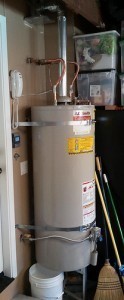 Hard water is bad news for a home in many ways. Here are a few:
Hard water is bad news for a home in many ways. Here are a few:
- It makes it tough to work up soap lather, turning simple cleaning and showering into hassles.
- It leaves buildup on the inside of pipes that lowers water pressure and leads to clogs.
- It stains laundry and dishes and leads to faded clothing.
But worst of all the problems with hard water is what it does to water-using appliances. The water heater is the most vulnerable. Hard water and a water heater are a bad mixture—and it usually ends tragically for the water heater.
We recommend you call a plumber in Apopka, FL if you have hard water in your home. A plumber can install the best solution—a whole-house water softener. This fixes all the problems we mentioned above, and it may save your water heater from an early replacement.
Why Hard Water Water Is Dismal for a Water Heater
Hard water is water that contains a high mineral count of magnesium, gypsum, and/or calcium. These minerals aren’t harmful to consume. In fact, they’re in most of the food you eat daily. But in high concentrations in water, they leave behind limescale. This is where the trouble with a water heater starts.
The temperature inside a water heater tank allows for the formation of limescale from hard water. The limescale settles along the tank floor. This sediment layer lowers the energy efficiency of a gas water heater, since this is the place where heat from the burners is transferred into the tank. An insulating layer of sediment makes this more difficult, forcing the water heater to run longer and drain more power. Flushing the tank fixes this, but it’s only a stopgap measure. The buildup will start again unless the hard water problem is stopped at the source.
Gas and Electric Water Heaters Suffer
Electric water heaters don’t fare any better. The limescale builds up on the heating elements, causing a similar drop in energy efficiency. Electric water heaters already cost more to run than gas models, and hard water can make them even costlier.
Hard water troubles don’t end with declining efficiency. Limescale buildup along the walls of a water heater’s tank prevents heat from naturally escaping to the outside. This sounds like something you’d want—but a water heater is balanced to account for standing heat loss. If more heat is trapped, the water in the tank overheats and damages the system. The tank can be de-scaled, but just like flushing, this is temporary and the trouble will soon restart.
What about Tankless Water Heaters?
Even within tankless water heaters, the problems are similar: scale buildup along the heat exchanger slows down the movement of heat, and efficiency suffers. Worse, the minerals deposits can close off the narrow flow passages through the tankless system, causing water pressure in the house to plummet.
Installing a Water Softener
A water softener swaps hard water minerals for sodium. When a professional plumber installs a whole-house water softener onto the main coming into your plumbing, you’ll have your hard water troubles eliminated. Your water heater will thank you with energy-efficient performance and a long service life. Talk to our water treatment experts today to arrange for water testing to find out if you need a water softener.
Modern Plumbing Industries, Inc. – Proudly Serving Central Florida Since 1975.
